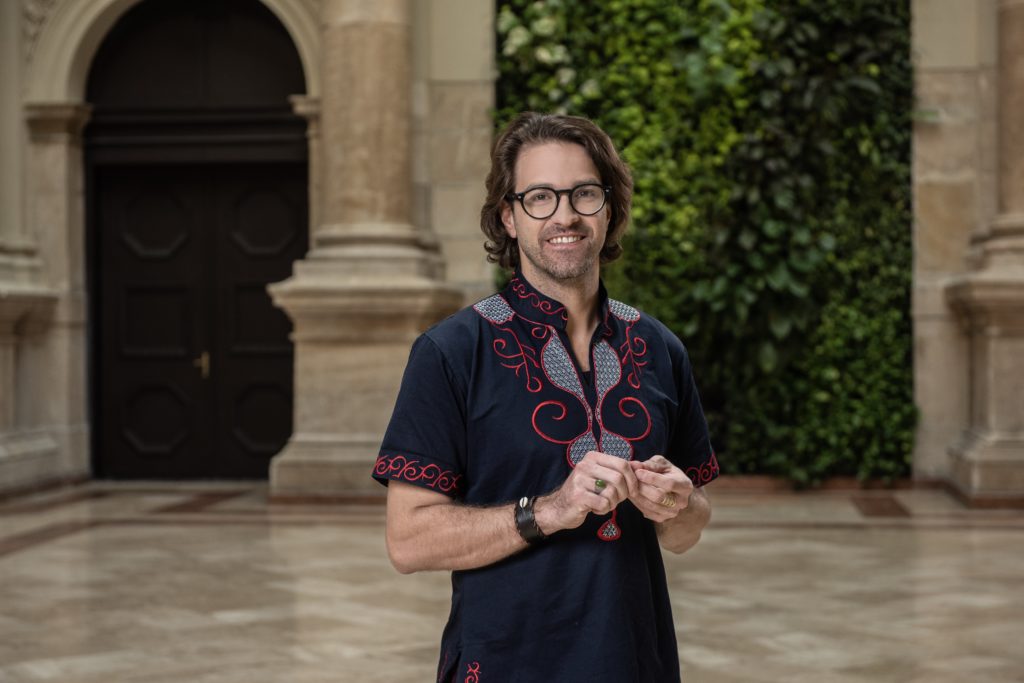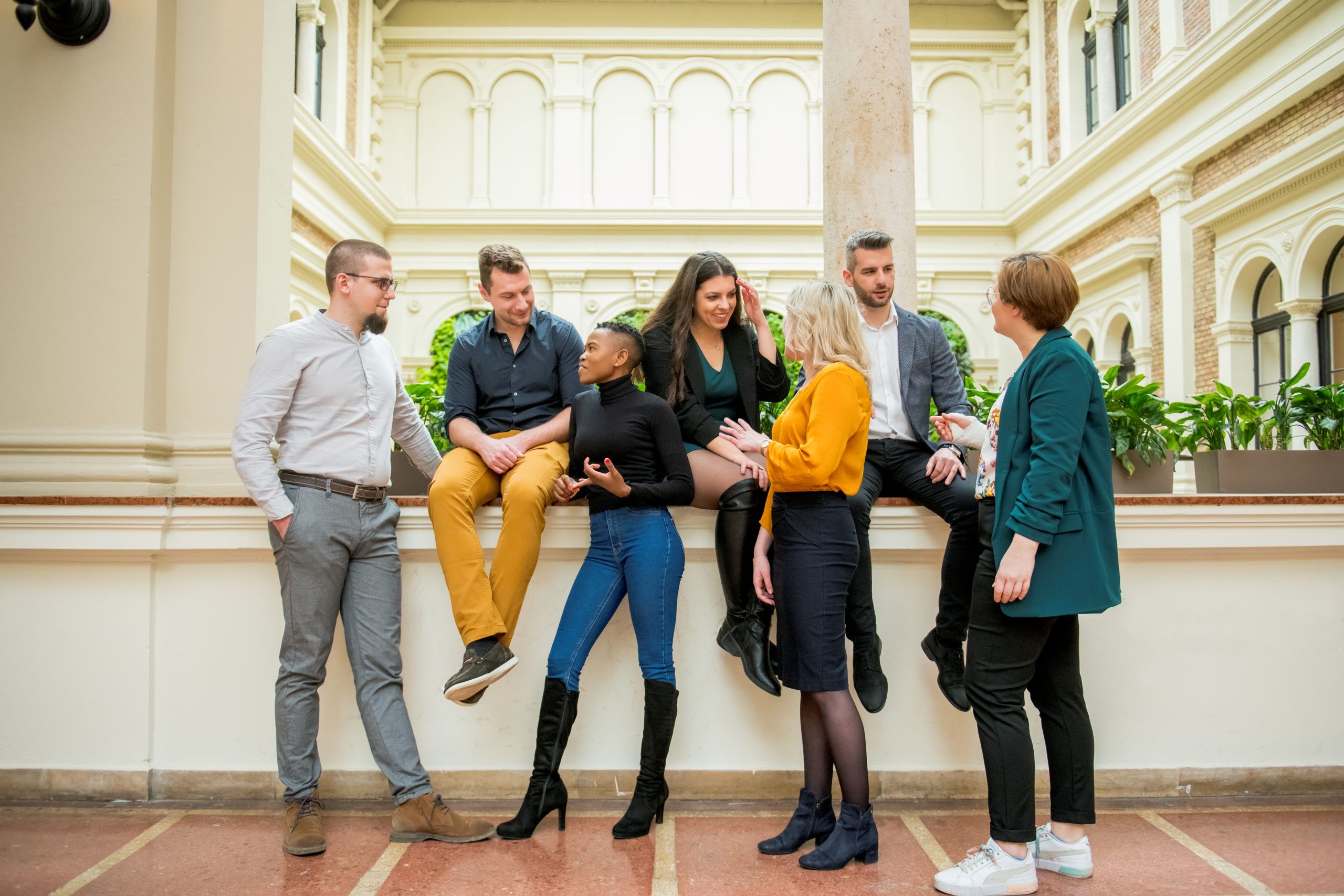“If you research a rare subject, it is easier to publish it” – The PhD story of Gergely Buda

In the following weeks, we tell the stories of PhD students who have received the Creative Research Idea Scholarship. Gergely Buda is passionate about Africa and green industrialisation.
Since he was a Master’s student, Gergő has known that he wanted to work on African projects. After completing a bachelor’s programme in international studies at Corvinus University, he studied in the master’s programme of international economy and business. Corvinus provided him the opportunity to spend a year in Berlin on an Erasmus scholarship. “In Berlin I took subjects at the university that were not available at home, such as African studies. I am really into Africa” – says Gergő.
When he came home, it was clear to him that he wanted to travel to Africa and work on projects there. He realised that he should take his chances through the business sector as he did not want to go out as a volunteer. In Hungary, he started working with an Africanist anthropologist and applied for a project in Nigeria. “It was a project of an engine rebuilding workshop in Tata, where I was the English-speaking manager. Unfortunately, the project soon failed as the service was not marketable.” Gergő spent three months in Africa then. “This trip was good to gain my first experience in Africa. I was really thrown into very deep water because I was in the industrial area of Lagos. There’s a part of the city that has acres and acres of car parts everywhere, and it’s a bit like hell on earth – at least my colleague greeted me with these words at the airport. So I landed in the middle of it straight away”.
“I was still attracted by Africa”
Since then, he has visited many countries in Africa. He lived in Accra, the capital of Ghana, for about six months with the aim of gaining experience and connecting Hungarian companies with local partners. However, the start-up businesses were not successful so he came home and started working for an engineering company. “I was able to travel a lot and see how an ordinary company works. But it wasn’t really my world. “I was still attracted by Africa” – remembers Gergő. He came across an opportunity when an Austrian company launched a project in Senegal. On their assignment, Gergő ran a bakery there for half a year to test the Austrian company’s newly developed sustainable oven. “I went out there and soon realised that there were also three other bakeries in a small area. The whole thing was not thought through carefully”. With three failed businesses behind him, he came home from Africa in 2019.
The global pandemic broke out soon. “I began working for a company where I practically nothing to do. And I could not travel or start a new project in Africa”. In that situation he remembered his old dream of obtaining a doctoral degree. This option was always on his mind as he tried academic writing at the Rajk College during his years at Corvinus. “However, after 7-8 years I was out of practice. I have not written any academic articles since I graduated from the university. So I though I would write to my old Corvinus teachers and say that I had an idea on a topic before applying for the course”.
For his topic, Gergő was inspired by a project in Senegal on sustainability. “The circular economy is trendy topic, easy to sell and currently relevant. And with an African topic, it’s quite easy to get in because few people are doing it.” He is the only one researching the African economy now at the Department of World Economy. He was warmly welcomed at the university, partly because the department has a long tradition of African studies.
Green industrialisation in three African countries
In the first two years of your PhD, you need to focus on and narrow down your research topic. “The first two years are like swimming alone in the sea, not knowing where the islands are. Then, towards the end of the second year, you see the palm trees on the horizon” – as Gergő described the process. He chose an interesting and tangible form of circular economy. Industrial symbiosis means that one company uses the industrial waste and by-products of another company as an input in its production. This B2B synergy is particularly relevant in Africa, where most countries want to industrialise. In his analysis, Gergő focuses specifically on the economic aspects, i.e. he examines cost-benefit factors based on semi-structured interviews with companies. His research aim is to contribute to the understanding of the problems of productivity and the burden on the environment in the sub-Saharan Africa region and to developing possible solutions.
Based on the existing literature, cases of industrial symbiosis can be found in roughly eight African countries in total. Gergő has selected from those to include different geographical regions, levels of development and economic structures in his research. In the end, he chose Mauritius, a developed, partly francophone island country. “In general, island countries are neglected in publications. “If you research a rare subject, it is easier to publish it” – explains Gergő. He also chose Uganda, a relatively poor country with an agriculture-based economy in eastern Africa. Ghana is located between the other two countries in terms of economic development and is located in the west.
The project is quite field research-intensive, as there are very few written resources on this topic. So Gergő has to travel a lot. He goes not only to international conferences, but also to the studied countries to collect data. So far, he has been to Uganda three times and has published several papers from his research there. He worked with local researchers and was able to organise a research assistant for himself who can continue the project in his absence. “In the academic world too, much depends on the network of contacts” – says Gergő.
Data collection instead of a safari
Thanks to a scholarship, from next September, Gergő will spend a year in Ghana, where his family will accompany him. His then eight-month-old daughter and her teleworking partner had travelled with him before. “My little girl was eating mangoes under the mango tree in Uganda” – says Gergő. But his family do not accompany him everywhere. “When I’m out there, I’m not out there to play safari, but to work hard and record hard data”. Gergő’s example shows that you can also make progress with a PhD as a parent. In fact, he sees the benefits of starting the process at an older age. “Things that used to freak me out in my twenties are much easier to get over now”.
What he has found in recent years is that he is attracted by the freedom offered by academic life and that he can do what he is passionate about. He also enjoys the opportunities offered by the student status: he can apply for scholarships, access a lot of academic literature owing to the subscriptions of the university and he can also get support to attend conferences. Last year I went to a conference in Ghana, thanks to the support of the university. There I met two Zambian researchers working on copper mines. We had breakfast together, and one of them mentioned that they had access to 300 mines anyway”. That triggered Gergő’s research imagination. When he came home, he immediately submitted an application for the New National Excellence Programme on that topic. He won the grant, so he is currently researching another topic in addition to his PhD.
His goal has not changed over the years: he wants to work on African projects in the long term. He expects his doctoral degree will help him to do this. “As a Hungarian, coming from a country that has minimal historical and current contact with Africa or the developing world as a whole, I felt that you need a PhD to have your CV looked at in international organisations. If you already have some publications on the subject, you’re in a better position. In fact, if you do this in an area that only few people research, you immediately become an expert on the subject”.
